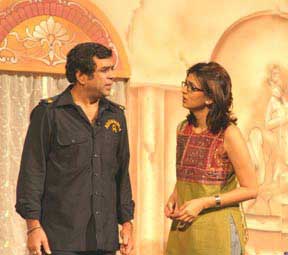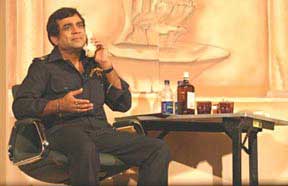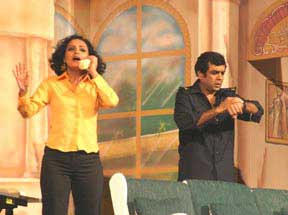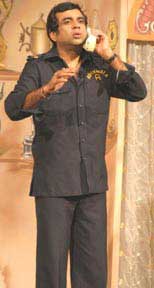Arts
Talking Seriously

Paresh Rawal traces his two decade journey in films and theatre
| He has excelled as an actor in all three mediums, theater, television and films. He has won both the National Film Award and the Filmfare award, among others. Today Paresh Rawal admits that he is in an enviable position when it comes to picking roles that he wants. In an exclusive interview with Little India, Rawal whose formidable acting prowess overshadows the leading lights of Indian Cinema, traces the journey that marks almost two decades of acting in films, why theater remains his passion, and why he spurns the trappings of stardom.
When did you realize that you wanted to be an actor?
I think every child is a natural ham, and wants to attract attention by doing some kind of natakbazi (play acting). I was very fortunate that my parents supported me in whatever I wanted to do. There was no pressure on me to become an engineer or doctor. All they said was, whatever you want to become in life, or do in life give it your 100 percent. I think it was in 9th grade while acting in plays I realized that this was what I wanted to do all my life. What was even more gratifying was that both in school and college my principals were so supportive, which is rare in a country where everyone will say, “Finish your education first then do other things on the side.” They on the contrary said, “Paresh you are very good at acting, don’t ever give it up.” I think while in school I realized I loved acting, but it was in college and acting in plays that I really began to understand the nuances of good acting and what differentiated it from bad acting. You chose to work in theater for a while before making a foray into films. How has theater changed over the years? Well theater is and will always be my first love. That is the arena where frankly I can do justice to the actor in me. I can really diversify and experiment with different genres, different themes to keep a healthy balance. I really can’t do that in films. In the 70s, the scene was very vibrant and enriching as far as Marathi and Gujarati Theater was concerned. I don’t think it was the same in Hindi or English theater, though I have worked in a Hindi interpretation of One Flew Over the Cuckoo’s Nest. In the 70s when I was involved in theater, our needs were very simple, the focus was not on the money which was paltry, but on good work. Today the audience has increased tremendously both in India and abroad. What about sponsorship? Do you have more sponsors backing up the product?
We do, but often the financiers have no clue about good theater. There are times when we look for sponsorship, and they will say okay we want 50 front row seats in turn. And who occupies those seats? Not the true lover of theater but just any riff raff they can send. It’s almost like, they will ask some of their honchos, “Hey what are you doing today? Not minding your shop? Go to the play-here are the tickets.” Sometimes they don’t send anyone and when the first 50 seats are empty, people who see a sold out sign outside feel they are being duped or misled. Even the producers and directors and the actors have stopped caring about presenting plays that are consistently rich in substance and content, plays that will give them creative satisfaction and enhance the reputation of theater as a whole. It’s more like focus on what sells and not what really matters. I think in the long run it may lead to the decline of theater, as audience expectations won’t be met. But your plays have always had a full house in the US. Plus what I find really wonderful about your plays are the short crisp dialogues, and how you make digs at things American or cleverly bring in current happenings, like the reference to Home Depot in one play and the Ambani split in the latest “Chaal baaz,” which was a stellar who dun it!
I have always focused on the spoken word and tried to make my dialogues as natural and as close to the way we speak normally. I don’t like long dialogues and excessive word play. Most people who come to see plays are a select audience, especially here when every month you have so much going on. If the plays don’t meet their expectations they won’t come. So it’s really important to focus on quality rather than the short term focus on making money. I spend almost four months or so in rehearsals, picking the right actors, focusing on every minute aspect of the play I act in or direct. Most people wrap it all up in a month. I think being talented is a very relative statement. Some may say I’m talented, but others may say Naseeruddin Shah is more talented than me and Robert De Niro is more talented than Naseer. It is not so much talent but the kind of attitude and dedication you bring to your work. I prefer to work with a cast that not only is talented, but will give more than 100 percent to their work. In fact we aren’t even allowed to bring the magnificent props we use in the same play back home because some of the auditoriums are very picky of what we can and cannot put on stage. So most plays that are staged are done with minimal props and we still make them look good because our actors make your forget the surroundings with their performances. May be that is why people are appreciative of the plays I bring here to the US. However I do feel that the marketing of plays in the U.S. is still not at par with the marketing of other shows. We need to do much more in that area. A lot of people have requested that you come out with DVDs of these plays. You made your entry into films with a small villainous role in the film “Arjun.” How did it feel when an actor of your caliber, had to make your foray in films with a nondescript villainous role. Then you were offered similar roles for a while before Ketan Mehta gave you the lead role of Sardar Patel in “Sardar” which netted you the National award. What did you discover about Sardar Patel when you did that role?
It’s funny, but unlike others I was never dazzled or impressed by the glitter of commercial cinema. In fact I wanted very much to start with art cinema or parallel cinema as it was called then. Commercial cinema somehow jarred my sensibilities as an actor. But I realized very soon that even parallel cinema had its own “star system” and its own cliques, where film directors who did such films would take actors like Naseer, Om Puri, Faroukh Shaikh etc. So I ended up making my debut in a commercial film. Here I have to acknowledge two film directors, who stepped into my life when I was beginning to be typecast as a villain and was doing mostly predictable roles that were sustaining me financially, but did nothing to sustain the actor in me. Ketan Mehta and Mahesh Bhatt stepped forward and said Paresh is a gifted actor first, before anything else. Do not turn him in to a stereotype. Ketan gave me the role of Sardar Patel and Mahesh Bhatt gave me films like Sir and Tamanna, and my life as an actor took a hugely different turn. Sardar Patel was a very controversial figure of his times. To portray him accurately meant that I had to exercise the utmost sensitivity and grace in bringing out his true character with finesse. To make him come alive without all the hype and misperceptions that had surrounded him and continue to do so even today, I had to make sure that every gesture I made, every word I spoke was not misinterpreted or projected on screen inaccurately. I feel that not only was I enriched by the experience of playing him, I became a better citizen of India by studying and getting to know a national hero of our times who never received the appreciation he deserved. If you look at history books, they only talk about the contribution of Nehru and Gandhi, but no one talks about men like Maulana Azad, Kriplani, Sardar Patel. If it had not been for Sardar Patel’s farsightedness and his ability to read the pulse of the people with such clarity, India would not have been a united nation. Each state would have been ruled by its own King or Prince. More than half of India did not participate or shed blood for the freedom of India. If every household in India had lost a family member the way people in Europe and America did in World War II, we would have appreciated the freedom we take so much for granted today. Unfortunately Indians are Punjabis, Gujaratis, Bengalis first and Indians later. Fortunately with globalization I’m glad we are becoming a bit proud of our achievements as Indians. Otherwise even the world did not perceive us as anything beyond being snake charmers and sadhus.
How was the experience and what did Tikku think of the film? I became a better citizen of India when I did Sardar, but after doing Tamanna, I think I became a better human being. I’m so grateful to Mahesh Bhatt for giving me that role. Until I did Tamanna, I had pretty much the same view of the Hijra community as any one else. They were the outcasts of society, loud, belligerent and brassily dressed and made up. They showed up on weddings and the birth of a male child, did their bawdy dances, took their money and left. They were depicted as caricatures even in the films. That the community has similar struggles that you and I go through in our life on a day to day basis, and have to pay rent, put food on the table, find work, never occurred to me. On top of that they are abused and shunned by those near and dear to them and by society. It was not an easy task, to give a human face to a community that had been mocked and depicted as caricatures all this time. They had become a stereotype that was so deeply engrained in the psyche of the general public. I also had to capture the nuance of their work without degrading it into something ribald or a bawdy mimicry of their life. When I actually went and lived their life, stripped off the trappings of assumptions, it was the most moving experience of my life. Tikku used to come to the sets every day. I told him, I’m not Tikku , but my endeavor will be to capture the essence of Tikku and his life. He was very happy with the end result. For someone like him who had been humiliated and shunned and looked down upon even by his own mother, to receive such recognition and appreciation was such redemption. He was overwhelmed and very emotional when the film finally came out. Meeting Tikku and knowing his story made me realize that he was more of a man than a lot of men I know. He just stands heads and shoulders above all of us. These two films seem close to your heart, but which is the role that you can say is the closest to your character, that this was you? Doing such roles gives me an opportunity for introspection. Both God and the devil reside within us, but circumstances force us to make good or bad choices. I see certain traits that I can identify with in each character I play. When I can’t identify with the traits that too makes me think. Why am I not identifying with those traits? American Chai was a cute film with nothing spectacular about it. I liked the director Anurag Kashyap. He is very hard working and has tremendous potential. Well, if you look at our films in India, we indulge in stereotyping as well. The village guy is always a simpleton, the city guy is always a crook. So its time to shatter these myths all across. But then most Indian cinema is not realistic cinema and most movie goers know that. You overshadowed the likes of Amitabh Bachchan in Ankhen and others in pretty much most films which are multistarrers. Fun2ssh was an interesting concept where petty thieves are transported into the 10th century and have to return to the 21st century, but personally I thought it was a lousy film and you were wasted in it. How do you choose your subjects?
Ankhen was a tailor made role for me. I think I’m right now in an enviable position where I can pick and choose the roles I want to do. Today the arena of character acting is split wide open. I think the hero ends up playing predictable roles, it’s the character actor that has become the parallel hero and at times has more footage than the hero himself. So I’m very fortunate. The only fear I have now is that from the initial villainous roles, I’m now being seen as a very talented comedian. Somehow all my comic roles have clicked. I have a morbid fear of being put in a slot. Fun2ssh was the biggest mistake of my life. The story narration was done so well, that I accepted the role, but by the second day I could see the producer who had backed some big projects and had the clout was most disinterested and the director was incompetent. I think they felt just having me there would sell their film as most of the other actors were rank newcomers. It would have been unethical to walk out of the film, so I did my best and am trying to forget that it ever happened. On the other hand I did the Telugu version of Munna Bhai MBBS and what a pleasure it was to work in the South. The southern film industry is amazingly professional, courteous and so hard working. I do have to say that the good thing that has happened is that by and large the new directors are very professional. We are getting fully bound scripts. The young actors of today are also very focused, business minded and professional. In terms of choosing projects, I tell myself that just as Lata and Asha ji do their riyaaz and it is in pure classical music, without knowing what they will get to sing at the end of the day, as long as I stay true to my craft, I will rise above the role. Again to make the ridiculous believable, to attempt a foolish role and pull it off also requires a kind of fearlessness! More than that it helps me hone my skills as an actor so when I get a meaty role I excel in it. You can’t sit waiting for only what you perceive as good roles and get rusty. Naseeruddin Shah said in an interview he hates doing films in languages he doesn’t understand and that for one of the films he just mouthed ikka dukka tikka(one, two, three) and they dubbed over it. On the contrary I try to learn the language and memorize my dialogues. Besides, the vocabulary in films is pretty limited. It’s not that difficult and these days a lot of films are using an extensive English vocabulary. Some languages like Telugu are so sweet, it’s a pleasure to speak in it. I feel to do justice to a role in another language I must honor the language before anything else and allow myself the pleasure of learning and speaking the language. You have dabbled in television too. This medium has come a long way from the days of Krishi Darshan and Chitrahaar. Yes but with that the quality has suffered. The sleaze that you see in most serials and the degradation is sickening. In spite of such a rich cultural heritage we are relegated to seeing inappropriate relationships, mother in law /daughter in law caricatures and promiscuity on television. Even the brazen way in which these serial are marketed and promoted is shameful. I can count on my fingers the number of good quality serials we’ve had to date. It is the same thing in films. Personally I find theater to be the most satisfying and the most intimidating of all mediums. It’s satisfying because the response is immediate, and it’s intimidating because there are no second takes. What is in the works now that is exciting? I heard you were planning to direct a film? In this world of glamour and glitter you are one of those rare actors who have been happily married for so many years, in spite of the fact that your wife and you are from such different backgrounds. What keeps you humble and grounded? As far as success is concerned it’s all in the mind. Its really important to see whether being successful prevents you from being human. If it’s creating a barrier between you and others, if it means you start believing that you and not the hundreds, who work in the background, are responsible for that success then you will come crashing down pretty soon. Starry tantrums can be thrown by even the pan wala , the milkman. At given times everyone is cranky or moody. I always remember that it’s the people who have poured their blood, sweat and tears into the script, the film direction, and the other day to day work and made me look like the star that people think I’m, are the ones responsible for my success. At the end of the day, I take my work very seriously, never myself. |






